- Home » Expat Articles » Interviews » American expat Living in China, Interview with Michelle
American expat Living in China, Interview with Michelle
| Published: | 29 Aug at 9 AM |
Want to get involved?
Become a Featured Expat and take our interview.
Become a Local Expert and contribute articles.
Get in touch today!
Become a Local Expert and contribute articles.
Get in touch today!
Filed: Interviews,China
Michelle is an ex-pat blogger living in western China. She spends her weekends exploring the cities/sites around Chengdu and trying to avoid the mouth-numbing Sichuan peppercorns that seem to end up sprinkled in every dish she orders. A middle school English teacher by trade, she blogs about life abroad, travel and books. Michelle's expat blog is called In Search of the End of the Sidewalk (see listing here)
Where are you originally from?
Idaho
In which country and city are you living now?
Chengdu, China
How long have you lived here and how long are you planning to stay?
I've been here one year and will be here one more, for a two year total. (I previously lived in Gansu province as a Peace Corps Volunteer, so my total China-time will be at four years when I move on next summer.)
Why did you move and what do you do?
My husband works for the US State Department at the consulate in Chengdu. I am a teacher by training, but unable to work in the schools at this time, but was lucky enough to find a job with the consulate as well. I am the Community Liasion Office Coordinator. My job consists of helping new officers/families get acquainted with the city, assisting with international schooling issues, making connections with the local community, as well as helping the spouses of officers find employment and a lot of event planning. It is a job that keeps me on my toes!
Did you bring family with you?
I am here with my husband. We do not have children.
How did you find the transition to living in a foreign country?
China is very different from the US, so there is definitely an element of culture shock when one first arrives. In Chengdu, there are few people who speak English, so having a working knowledge of Mandarin is extremely helpful. Chengdu is a growing city and one that is striving to gain a more metropolian status, so while there are currently not a huge number of western-style restaurants/supermarkets, they are expanding.
Was it easy making friends and meeting people; do you mainly socialise with other expats?
While I would say that I mainly socialize with ex-pats, I have had the opportunity to meet and work with some really great local folks. Because my job entails a lot of community interaction and event planning, I do tend to have a pretty tight group of friends within the American community, but would say I've definitely enjoyed getting to know the citizens of the city.
What are the best things to do in the area; anything to recommend to future expats?
Pandas! That is by far the number one reason tourists come to Chengdu. We've got a great research base on the edge of town where you can spend a lovely morning visiting giant pandas and red pandas. For a mere $300USD you can even hold a panda!
Outside of pandas, the area has some beautiful sightseeing opportuntities. A visit to the Giant Buddha at LeShan is a must-see, as is a weekend trip to JiuZhaiGou- China's answer to Yellowstone.
What do you enjoy most about living here?
There area lot of great things about Chengdu, including the spicy food, but I would say the best part about the city is the countryside surrounding it. Just an hour outside of the city you will find beautiful fields, majestic mountains and clear skies.
How does the cost of living compare to home?
People coming to China often expect that everything is very cheap here, but that's not the reality of living in the country on an extended basis. Anything "western" is very expensive, including name brand clothing. It may be made in China, but it is then shipped to the US, and then returned with a huge import tax added on to the original price.
Food can be found for very inexpensive, but it is important to be careful about knowing where the food comes from, as quality can be an issue. If it seems like too good of a price to be true, there is probably a reason.
What negatives, if any, are there to living here?
The biggest drawback to living in Chengdu is the pollution. Yearround, the city has high levels of air pollution, that spike over the winter months.
If you could pick one piece of advice to anyone moving here, what would it be?
I'd remind them to come with an open mind. Chengdu is not an American city and if that is what you want, you should stay home. There are quirks about the city and people that can be frustrating at times, but when I hear people complain, saying, "That's not how we do it in the US," I want to remind them they aren't in the US. Why should the locals do things our way when it is their country? Learn to let the little things go and enjoy the quirks!
What has been the hardest aspect to your expat experience so far?
Living in Chengdu has been an easy transition and I've not run into any really big problems. Getting ahold of American food for the holidays can be tough, but otherwise, the last year has been a very good one.
What are your top 5 expat tips for anyone following in your footsteps?
Tell us a bit about your own expat blog.
In Search of Where the Sidewalk Ends is my attempt to record both the extraordinary and mundane events of life as the spouse of a Foreign Service officer.
Before becoming an “EFM” (Foreign Service code for spouse/children), I worked as an 8th grade English and reading teacher. I took a two-year leave of absence from 2006-2008 so that Thad and I could join the Peace Corps. We served as PCVs in Gansu, China during that time, after which I returned to the States for a few years before heading out on the road again.
The most common question that I have been asked as we prepared for the move from Idaho to China is “What are you going to do?” Thad’s career is pretty laid out, but mine is in a much more unknown state at this point. With each move, I will have to search for a new job, but wherever I go, I will continue to blog about life in another country, travel and books- just a few of my favorite things.
How can you be contacted for further advice to future expats coming to your area?
Through my blog is the best way to contact me (see link below) I read and respond to all legitimate comments posted there and I am more than happy to chat with people considering a move to western China.
Here's the interview with Michelle...
Where are you originally from?
Idaho
In which country and city are you living now?
Chengdu, China
How long have you lived here and how long are you planning to stay?
I've been here one year and will be here one more, for a two year total. (I previously lived in Gansu province as a Peace Corps Volunteer, so my total China-time will be at four years when I move on next summer.)
Why did you move and what do you do?
My husband works for the US State Department at the consulate in Chengdu. I am a teacher by training, but unable to work in the schools at this time, but was lucky enough to find a job with the consulate as well. I am the Community Liasion Office Coordinator. My job consists of helping new officers/families get acquainted with the city, assisting with international schooling issues, making connections with the local community, as well as helping the spouses of officers find employment and a lot of event planning. It is a job that keeps me on my toes!
Did you bring family with you?
I am here with my husband. We do not have children.
How did you find the transition to living in a foreign country?
China is very different from the US, so there is definitely an element of culture shock when one first arrives. In Chengdu, there are few people who speak English, so having a working knowledge of Mandarin is extremely helpful. Chengdu is a growing city and one that is striving to gain a more metropolian status, so while there are currently not a huge number of western-style restaurants/supermarkets, they are expanding.
Was it easy making friends and meeting people; do you mainly socialise with other expats?
While I would say that I mainly socialize with ex-pats, I have had the opportunity to meet and work with some really great local folks. Because my job entails a lot of community interaction and event planning, I do tend to have a pretty tight group of friends within the American community, but would say I've definitely enjoyed getting to know the citizens of the city.
What are the best things to do in the area; anything to recommend to future expats?
Pandas! That is by far the number one reason tourists come to Chengdu. We've got a great research base on the edge of town where you can spend a lovely morning visiting giant pandas and red pandas. For a mere $300USD you can even hold a panda!
Outside of pandas, the area has some beautiful sightseeing opportuntities. A visit to the Giant Buddha at LeShan is a must-see, as is a weekend trip to JiuZhaiGou- China's answer to Yellowstone.
What do you enjoy most about living here?
There area lot of great things about Chengdu, including the spicy food, but I would say the best part about the city is the countryside surrounding it. Just an hour outside of the city you will find beautiful fields, majestic mountains and clear skies.
How does the cost of living compare to home?
People coming to China often expect that everything is very cheap here, but that's not the reality of living in the country on an extended basis. Anything "western" is very expensive, including name brand clothing. It may be made in China, but it is then shipped to the US, and then returned with a huge import tax added on to the original price.
Food can be found for very inexpensive, but it is important to be careful about knowing where the food comes from, as quality can be an issue. If it seems like too good of a price to be true, there is probably a reason.
What negatives, if any, are there to living here?
The biggest drawback to living in Chengdu is the pollution. Yearround, the city has high levels of air pollution, that spike over the winter months.
If you could pick one piece of advice to anyone moving here, what would it be?
I'd remind them to come with an open mind. Chengdu is not an American city and if that is what you want, you should stay home. There are quirks about the city and people that can be frustrating at times, but when I hear people complain, saying, "That's not how we do it in the US," I want to remind them they aren't in the US. Why should the locals do things our way when it is their country? Learn to let the little things go and enjoy the quirks!
What has been the hardest aspect to your expat experience so far?
Living in Chengdu has been an easy transition and I've not run into any really big problems. Getting ahold of American food for the holidays can be tough, but otherwise, the last year has been a very good one.
What are your top 5 expat tips for anyone following in your footsteps?
- Be ready for spicy! Chengdu is known for its Sichuan peppercorn, which makes its way into all sorts of dishes. This huajiao will numb your tongue and lips, making dinner an interesting experience.
- Western sizes can be difficult to find. If you have bigger feet, be sure to bring spare shoes with you. The same goes for clothing, especially if you are tall.
- Travel! Chengdu is an okay city, but the best places lie outside the city boundaries. Visit the monkeys at Emei Mountain. Raft the river at QingCheng Mountain. See the ancient irrigation system in DuJiangYan. Don't spend every weekend in the city or you'll go crazy. Get out, get some fresh air, see the sun and visit the great places China has to offer.
- Don't let the cultural differences get to you. This is not America. You will see people spitting on the street and children using the sidewalk as a toilet. You will get shoved over by an old lady as you try to get on the subway and you will have your photo taken as you wait in line to buy groceries. Think of every day as a new adventure!
- If you are moving to Chengdu long-term, invest in an air purifier (or two!) for your apartment. Your lungs will thank you.
Tell us a bit about your own expat blog.
In Search of Where the Sidewalk Ends is my attempt to record both the extraordinary and mundane events of life as the spouse of a Foreign Service officer.
Before becoming an “EFM” (Foreign Service code for spouse/children), I worked as an 8th grade English and reading teacher. I took a two-year leave of absence from 2006-2008 so that Thad and I could join the Peace Corps. We served as PCVs in Gansu, China during that time, after which I returned to the States for a few years before heading out on the road again.
The most common question that I have been asked as we prepared for the move from Idaho to China is “What are you going to do?” Thad’s career is pretty laid out, but mine is in a much more unknown state at this point. With each move, I will have to search for a new job, but wherever I go, I will continue to blog about life in another country, travel and books- just a few of my favorite things.
How can you be contacted for further advice to future expats coming to your area?
Through my blog is the best way to contact me (see link below) I read and respond to all legitimate comments posted there and I am more than happy to chat with people considering a move to western China.
Grab a featured expat badge that links to this interview!
 Copy and paste code to display the Featured Expat Badge:
Copy and paste code to display the Featured Expat Badge:Comments » There is 1 comment

Tisha wrote 11
years ago:
Hey Michelle, Thanks a lot for all the information. I am moving to Chengdu in Aug-Sep this year. I am going to work there as an English teacher. The company is providing me free accommodation. They are paying me 644$ a month and I am really concerned about the expenses. Can you please let me know if this much money is enough to cover the basic utilities and my monthly expenses? The project is for a year. Is there any part time jobs available for foreigners in terms of earning some extra money? Thanks a lot in advance.
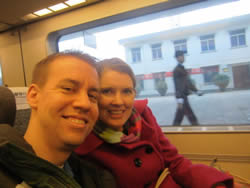
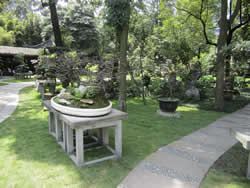
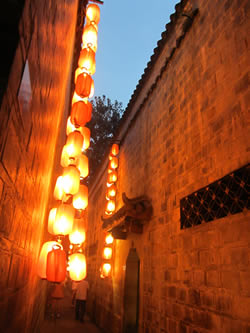
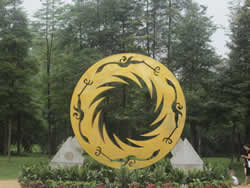
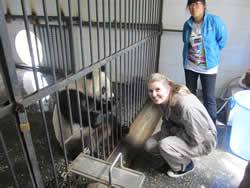
 Michelle is an American expat living in China. Blog description: In Search of Where the Sidewalk Ends is my attempt to record both the extraordinary and mundane events of life as the spouse of a Foreign Service officer.
Michelle is an American expat living in China. Blog description: In Search of Where the Sidewalk Ends is my attempt to record both the extraordinary and mundane events of life as the spouse of a Foreign Service officer.





